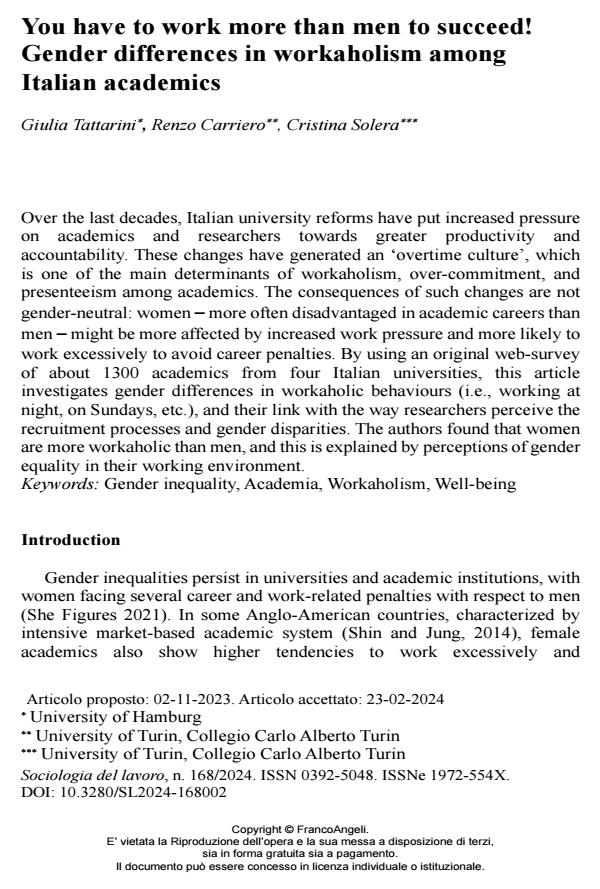You have to work more than men to succeed! Gender differences in workaholism among Italian academics
Titolo Rivista SOCIOLOGIA DEL LAVORO
Autori/Curatori Giulia Tattarini, Renzo Carriero, Cristina Solera
Anno di pubblicazione 2024 Fascicolo 2024/168
Lingua Inglese Numero pagine 22 P. 28-49 Dimensione file 271 KB
DOI 10.3280/SL2024-168002
Il DOI è il codice a barre della proprietà intellettuale: per saperne di più
clicca qui
Qui sotto puoi vedere in anteprima la prima pagina di questo articolo.
Se questo articolo ti interessa, lo puoi acquistare (e scaricare in formato pdf) seguendo le facili indicazioni per acquistare il download credit. Acquista Download Credits per scaricare questo Articolo in formato PDF

FrancoAngeli è membro della Publishers International Linking Association, Inc (PILA), associazione indipendente e non profit per facilitare (attraverso i servizi tecnologici implementati da CrossRef.org) l’accesso degli studiosi ai contenuti digitali nelle pubblicazioni professionali e scientifiche.
Over the last decades, Italian university reforms have put increased pressure on academics and researchers towards greater productivity and accountability. These changes have generated an ‘overtime culture’, which is one of the main determinants of workaholism, over-commitment, and presenteeism among academics. The consequences of such changes are not gender-neutral: women – more often disadvantaged in academic careers than men – might be more affected by increased work pressure and more likely to work excessively to avoid career penalties. By using an original web-survey of about 1300 academics from four Italian universities, this article investigates gender differences in workaholic behaviours (i.e., working at night, on Sundays, etc.), and their link with the way researchers perceive the recruitment processes and gender disparities. The authors found that women are more workaholic than men, and this is explained by perceptions of gender equality in their working environment.
Parole chiave:Gender inequality, Academia, Workaholism, Well-being
- Predictores de la adicción al trabajo entre profesores universitarios de posgrado brasileños Mary Sandra Carlotto, Sheila Gonçalves-Câmara, in Acciones e Investigaciones Sociales /2025
DOI: 10.26754/ojs_ais/accionesinvestig.soc..20254711051 - İşkoliklik ve İş-Aile Çatışmasi İlişkisi: Cinsiyetin Düzenleyicilik Etkisinin İncelenmesi Gökhan Kenek, Tuğçe Şimşek, in Journal of Yaşar University /2025 pp.695
DOI: 10.19168/jyasar.1662265
Giulia Tattarini, Renzo Carriero, Cristina Solera, You have to work more than men to succeed! Gender differences in workaholism among Italian academics in "SOCIOLOGIA DEL LAVORO " 168/2024, pp 28-49, DOI: 10.3280/SL2024-168002